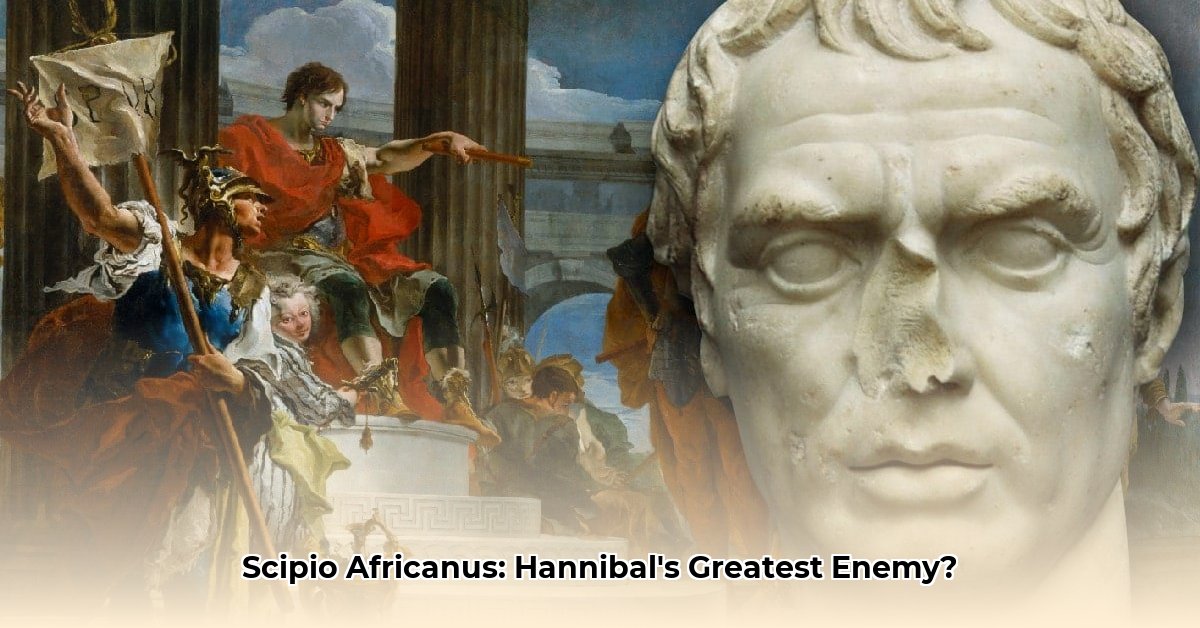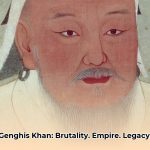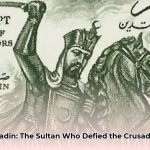Scipio Africanus: the name resonates with tales of epic battles and exceptional military strategy. The life of this renowned Roman general extends beyond battlefield victories. This exploration delves into his complete story, from his initial encounters against Hannibal (and his improbable survival at Cannae!), to his strategic maneuvers in Spain that propelled him to prominence. We’ll dissect his momentous victory at Zama, analyzing how he masterfully countered Hannibal and his war elephants. Beyond military achievements, we’ll examine the complex political dynamics that precipitated Scipio’s decline and exile. It’s a narrative of remarkable triumph and profound disappointment, exploring his enduring influence on our perception of Roman military strength and political intrigue. For more on military strategy, see Sun Tzu’s strategies.
Scipio Africanus: The Roman General Who Triumphed Over Hannibal
Scipio Africanus. The name evokes images of grand battles and Roman dominance. But who was this figure who ultimately defeated the seemingly invincible Hannibal? We explore the life and legacy of one of Rome’s most celebrated – and controversial – military commanders, examining his battlefield genius alongside his political struggles within the Roman Republic.
A Young Man’s Introduction to War
Publius Cornelius Scipio was born into a family with influence. His father and uncle, both distinguished Roman generals, provided him with valuable insight into the Roman military system. His early immersion into the Second Punic War exposed him firsthand to the devastating Roman defeat at Cannae in 216 BC, where tens of thousands of Roman soldiers were killed. Although such a loss could have discouraged many, Scipio used it as a vital learning opportunity. By observing the battle’s carnage and the Roman army’s strategic failures, he began to develop his own military genius, learning from both successes and failures to improve future military engagements.
The Spanish Campaign: Strategy Beyond the Battlefield
Scipio’s campaign in Spain marked a turning point in the war. More than just winning battles, he demonstrated an understanding of the broader strategic landscape, recognizing the power of political influence. While Hannibal was causing havoc in Italy, Scipio secured control of Spain through military skill and shrewd diplomacy, recognizing that winning the support of the local population was as important as winning battles. His capture of New Carthage in 209 BC demonstrates this foresight. It was a calculated operation that showcased strategic planning and risk management. Moreover, his victory at Ilipa in 206 BC cemented his reputation as a brilliant military tactician who effectively used guile and strategy alongside brute force. While historians continue to debate specific tactical choices, his success remains undeniable.
A Risky Venture: Bringing War to Africa
After securing Spain, Scipio made a bold decision: he proposed invading Carthaginian territory in Africa, a calculated gamble despite the risks. While the Roman Senate was initially hesitant, preferring a more cautious approach, Scipio remained confident in his strategy. His African campaign required careful planning, balancing land and sea power, and a detailed understanding of logistics. By taking the fight to Africa, Scipio demonstrated a comprehensive approach to military planning.
Zama: The Defining Clash
The Battle of Zama in 202 BC remains a legendary encounter between two of history’s greatest military minds, Scipio and Hannibal. Despite Hannibal’s reputation for innovative strategies and tactical brilliance, he faced a worthy opponent in Scipio, whose clever tactics neutralized Hannibal’s famed war elephants. The Carthaginian army was decisively defeated, marking the end of the Second Punic War and establishing Rome’s dominance over the Mediterranean. More than just a military victory, Zama was a symbolic triumph, concluding the decades-long conflict and solidifying Rome’s status as a global power. This victory showcased Scipio’s mastery of battlefield tactics.
The Hero’s Exile: Political Intrigue
Upon his return to Rome, Scipio was celebrated as a conquering hero. However, the political climate was treacherous, with jealousy and political maneuvering casting a shadow over his later years. Accusations of corruption and bribery, possibly used by his enemies to undermine his influence, led to his exile. This tragic end for a man who had brought so much glory to Rome highlights the precarious nature of power and fame in the ancient world, demonstrating that even the most brilliant military minds can fall victim to political intrigue.
Scipio’s Enduring Impact: Innovation and Legacy
Scipio’s strategic innovations significantly shaped Roman military doctrine. His adaptable approach, willingness to take calculated risks, and use of combined arms tactics revolutionized Roman warfare.
| Strategic Aspect | Scipio’s Approach | Impact on Roman Military Doctrine |
|---|---|---|
| Iberian Campaign Strategy | Integrated diplomatic and military strategies. Secured key cities. Focused on winning the support of local populations. | Emphasized combining non-military tactics with military operations for territorial control. |
| Battle of Zama Tactics | Neutralized enemy strengths by innovative positioning. Used combined arms tactics. | Improved cavalry/infantry coordination. Led to more flexible approaches to battlefield tactics. |
| Overall Military Philosophy | Promoted adaptability. Supported calculated risk-taking. Encouraged innovative solutions. | Encouraged flexibility and adaptability so Roman armies could adapt to different terrains and opponents. |
While specific details of Scipio’s battles are still researched and debated by historians, his legacy as a military genius remains. His story serves as a compelling narrative of remarkable achievements and tragic downfall. As a complex figure, a master strategist, and a political victim, his life continues to intrigue and inspire discussion, offering insights into leadership, strategy, and the unpredictable nature of power.
How Scipio Africanus’s Political Demise Affected Roman Expansion
Key Takeaways:
- Scipio’s military genius secured Roman dominance after the Second Punic War.
- Accusations from his political adversaries undermined his power.
- Political turmoil distracted Rome from further foreign expansion.
- His exile led to a leadership vacuum and hindered military campaigns.
- The controversy exposed flaws in the Roman political system.
From Military Icon to Political Outcast
Scipio Africanus, a name synonymous with battlefield brilliance, defeated Hannibal, Rome’s greatest enemy. But his story doesn’t end with triumph. His rapid rise was followed by a fall, affecting not only his life but also the trajectory of Roman expansion. What events caused the tragic end of this celebrated hero?
His early military achievements were impressive. Though initially disastrous for Rome, battles such as Ticinus and Cannae displayed his strategic acumen and courage. He learned from defeat, adapting and innovating. His conquest of Spain showcased his military skills. The pivotal capture of New Carthage provided a base for operations, and his victory at Ilipa essentially broke Carthaginian power in the Iberian Peninsula.
Zama: Victory and Foreshadowing
The Battle of Zama remains a pivotal historical event. Scipio’s tactics and neutralizing of Hannibal’s war elephants led to a decisive victory, securing Rome’s dominance. While cementing Rome’s status, this also planted the seeds of Scipio’s decline as such success bred political resentment.
The Roots of Discord: The Impact on Roman Expansionism
Scipio’s return to Rome was not peaceful. Accusations of corruption, though debated, undermined his standing, with historians suggesting these were politically motivated attacks by rivals due to his accomplishments. Whatever the reasons, the allegations led to a loss of support and eventual exile, which was not just a personal tragedy but had profound consequences for Roman foreign policy.
Absence of Leadership: Impact on Expansion
Scipio’s absence created a power vacuum and affected Roman expansionism:
- Absence of Leadership: Without a figure as charismatic as Scipio, planning and executing major campaigns became challenging.
- Internal Conflicts: Political infighting hindered decisive action on foreign policy, and the focus shifted from conquest to internal issues.
- Missed Opportunities: The lack of a strong leader meant that Rome missed opportunities to expand its influence, so the Roman machine faltered. This period saw a shift from aggressive expansion as Rome consolidated conquered territories.
His story highlights that his downfall slowed Roman expansion and reduced Rome’s capacity to project power.
Legacy of Complexity
Scipio’s story is a reflection of the Roman Republic’s strengths and weaknesses. While his military legacy remains intact, his political demise serves as a cautionary tale about power, ambition, and the tensions between individuals and the state. He remains a figure of debate, and historians find that he is a reflection of the Roman Republic’s strengths and weaknesses.
Scipio Africanus’s Spanish Campaign: Strategic Brilliance
Key Takeaways:
- Military and diplomatic innovation marked his Spanish campaign.
- He tactically used Carthaginian weaknesses and the Iberian political climate.
- Victories at New Carthage and Ilipa shifted the Second Punic War.
- Leadership and planning were keys to his success.
- His campaign is a case study for contemporary leaders.
The Rise of the Commander
Amidst the Roman Republic’s struggle in the Second Punic War, Scipio Africanus emerged as a beacon of hope in Hispania. The defeats at Ticinus and Cannae had left Rome vulnerable, with Hannibal dominating the Italian Peninsula. Earlier Roman efforts in Spain faltered, they were held by Carthaginian forces led by Hasdrubal Barca and Mago. Scipio devised an ambitious two-pronged strategy aimed at undermining Carthaginian dominance while forging alliances with Iberian tribes. It was a blend of war and diplomacy and this strategic adaptation was the key to Scipio’s success.
The Art of Deception
Scipio grasped the importance of surprise and his assault on New Carthage was a prime example of this. The Carthaginian capital fell through a combination of strategic maneuvers and calculated risks. His strategies disrupted Carthaginian reinforcements and caught them off guard. They had underestimated Scipio’s audacity.
Ilipa: Tactical Brilliance
The Battle of Ilipa showcased Scipio’s tactical genius where he faced Hasdrubal but secured victory through adaptable strategies and troop deployment.
A Cascade of Effects
Scipio’s triumphs in Spain rippled across the Mediterranean, forcing Hannibal to reconsider his strategies. This shift ultimately led to their confrontation at Zama.
Long-Term Effects
His emphasis on adaptability, tactics, and the integration of military and political maneuvers serve as an example. Scipio’s life remains a testament to adaptability.
Scipio Africanus’s Political Downfall: Roman Power
Key Takeaways:
- His military prowess secured Rome’s dominance, but that was not the end of the story.
- His conflict with rivals exposed the instability of Roman politics.
- The legitimacy of charges against him continues to be debated.
- His legacy blends military accomplishments and political setbacks.
- His story is a lesson of Roman politics and the challenge of balancing ambition.
From Military Success to Political End
Scipio Africanus orchestrated victories over Hannibal, securing his place as a Roman hero. However, this triumph gave way to political battles. Given the dynamics of the Roman Republic, was his eventual political demise inevitable?
Becoming A Military Leader
Scipio’s early career displayed strategic brilliance learned from engagements such as Ticinus and Cannae. He adapted to enemy strengths and weaknesses. In Spain, Scipio skillfully used diplomacy, which weakened Carthage from within. His capture of New Carthage demonstrated cunning and set the stage for dominance.
The Heights of Victory
Zama marked the height of Scipio’s achievements and his handling of Hannibal’s war elephants secured victory. This success made him Rome’s champion and represented the peak of his influence.
Seeds of Discord
However, his very success proved to be a detriment in that these successes caused political conflicts. Accusations and his arrogance contributed to his downfall. His political arena proved as challenging as any battlefield.
Contradictory Legacy
His legacy is one of stark contrasts. The story is one of achievement and political downfall. Despite this, he altered the trajectory of Roman power.
1: Adrian Goldsworthy, The Punic Wars. Yale University Press, 2006.
- Discover Life in a Medieval Castle: Beyond Battles & Banquets: Unveiling Daily Life - August 2, 2025
- Scipio Africanus: Hannibal’s Nemesis: Rise, Fall, and Legacy - August 2, 2025
- Unveiling Superorganisms: Are Ant Colonies One Mind? - August 2, 2025















